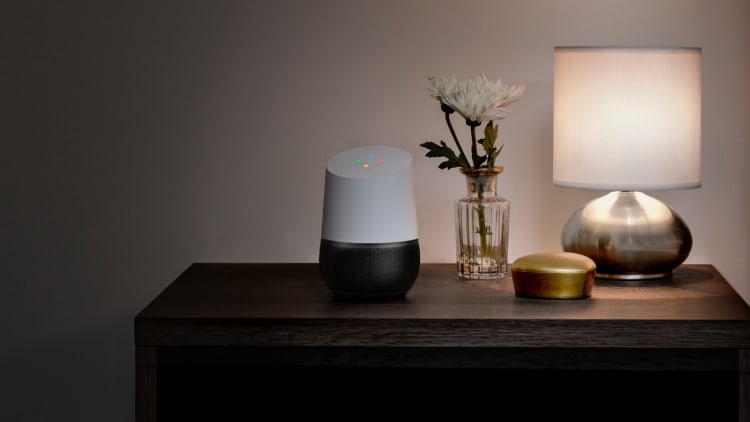
Google announced Wednesday a voice-activated home device, similar to Amazon Echo, to launch later this year.
The device syncs to a smartphone version called Assistant, and links to streaming device Chromecast and smart home brand Nest.
Mario Queiroz, Google's vice president of product management, showed off the small white conical object at Google's annual developer event. What sets the product apart, Queiroz said, is the device's direct link to all the capabilities of Google search.
"Home is where lots of daily tasks just need to get done," Queiroz told an audience at Google's I/O conference Wednesday. "Access to the Google Assistant makes this a lot easier. It's like having a voice-activated remote control to the real world whenever you need it."
Sundar Pichai demonstrated a conversation with Google's new smartphone Assistant, highlighting what he called conversational capability "far beyond what other assistants can do." The technology, similar to Apple's Siri, comes as 20 percent of mobile searches are voice queries, according to Pichai, CEO of Alphabet's Google division.
Google has spent years evolving search to be much more assistive and help people get things done in the "real world," Pichai said, training voice and photo recognition to be more precise. For instance, asking a phone "What's playing tonight?" should result not just in movie times, but personalized movie suggestions that can be discussed like a normal conversation, he said.
"It is truly the moment of mobile," Pichai said, as Google celebrates a decade of working on Android, now the world's most popular mobile operating system. "We are pushing ourselves really hard so that Google is evolving and staying ahead of our users."
The company announced new apps, available this summer, in conjunction with the new Assistant and Google Home.
Messaging app Allo lets users operate Google search within chats. For instance, when sent a photo of food, Allo can detect what the food is and suggest a reply of "yummy," "I love linguine," or even suggest a similar restaurant nearby, Google's developers demonstrated. Allo can contact Google by typing @google in any chat.
The app also offers suggestive replies to messages and even photos, changes message sizes to convey "loud" or "quiet" expressions and lets you draw directly on images, according to a demo at the event. It also offers an "incognito" chat mode that is end-to-end encrypted and can be permanently deleted, similar to a browser window mode by the same name in Google Chrome.
Another app, Duo, enables video chats similar to Apple's FaceTime app but is available on both Android and iOS.
Android's latest operating system, now named N, was also front and center during the event. N features Vulkan, a graphics processor that allows game developers to put in more effects per frame while maintaining a high frame rate, said Dave Burke, vice president of engineering at Android. Other changes were made to streamline updates, storage and battery life, and improve encryption, Burke said.
More than 90 percent of the time people only select one of the last seven apps used, Burke said, inspiring Android to create a "quick switch" function to automatically return to the last app a user was in, and creating an option that clears all open apps.
Users can also have multiple apps open at the same time in a split screen on Android N and reply to messages directly from the notification screens. These features, now in beta, will roll out later this summer, Burke said.
N will also enable Daydream, a platform for high-quality virtual reality. It's designed to encourage developers to create VR across different devices, including Android smartphones, that's capable of rendering at a very high frame rate and resolution and minimizes the lag to update images when users move their heads, said Clay Bavor, vice president of virtual reality at Google.
"We wanted to create something that has the best attributes of [current VR visor] Carboard, but is also comfortable, richly interactive and far more immersive," Bavor said. "To create that kind of immersion … you have to solve a lot of really hard problems."
Samsung, HTC, LG, Xiaomi, Huawei and others have phones that work with Daydream coming as soon as this fall, Bavor said. A special controller that Bavor demonstrated is also in the pipeline for fall.
Finally, Google debuted Android Wear 2.0, an overhaul of its smartwatch platform that will now work with both Android and iPhones, whether phones are on or off. Like Android's phone platform, the wearable version is highly customizable across devices.
Google's annual developer conference is widely known to be the source of new product announcements from the technology giant. This year's event has 7,000 attendees and streams to China, Istanbul, Sri Lanka and Dublin, Pichai said.
For developers, the core audience at Wednesday's event, Google offered demonstrations of new interfaces for programming, analytics and machine learning on Google Cloud.
By the end of the year, Google also hopes to run apps instantly, without having to download and install them, just like links open in a browser. Beyond that, Pichai sees artificial intelligence in robots and healthcare as one of Google's major differentiators.
"We live in very, very exciting times," Pichai said. "Computing has had an amazing evolution."






